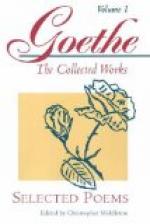Yet doth a new one, at once, cling to the one gone
before,
So that the chain be prolonged for ever through all
generations,
And that the whole may have life, e’en as enjoy’d
by each part.
Now, my beloved one, turn thy gaze on the many-hued
thousands
Which, confusing no more, gladden the mind as they
wave.
Every plant unto thee proclaimeth the laws everlasting,
Every flowered speaks louder and louder to thee;
But if thou here canst decipher the mystic words of
the goddess,
Everywhere will they be seen, e’en though the
features are changed.
Creeping insects may linger, the eager butterfly hasten,—
Plastic and forming, may man change e’en the
figure decreed!
Oh, then, bethink thee, as well, how out of the germ
of acquaintance,
Kindly intercourse sprang, slowly unfolding its leaves;
Soon how friendship with might unveil’d itself
in our bosoms,
And how Amor, at length, brought forth blossom and fruit Think of the manifold ways wherein Nature hath lent to our feelings,
Silently giving them birth, either the first or the last! Yes, and rejoice in the present day! For love that is holy
Seeketh the noblest of fruits,—that where the thoughts are the same, Where the opinions agree,—that the pair may, in rapt contemplation,
Lovingly blend into one,—find the more excellent world.
1797. -----
Proverbs.
----- ’Tis easier far a wreath to bind, Than a good owner fort to find. ----- I kill’d a thousand flies overnight, Yet was waken’d by one, as soon as twas light. ----- To the mother I give; For the daughter I live. ----- A Breach is every day,
By many a mortal storm’d;
Let them fall in the gaps as they may,
Yet a heap of dead is ne’er form’d. ----- What harm has thy poor mirror done, alas? Look not so ugly, prythee, in the glass!
1815.* ----- Tame Xenia.
The Epigrams bearing the title of Xenia were written by Goethe and Schiller together, having been first occasioned by some violent attacks made on them by some insignificant writers. They are extremely numerous, but scarcely any of them could be translated into English. Those here given are merely presented as a specimen.
God gave to mortals birth,
In his own image too;
Then came Himself to earth,
A mortal kind and true.
1821.* ----- Barbarians oft endeavour
Gods for themselves to make
But they’re more hideous ever
Than dragon or than snake.
1821.* ----- What shall I teach thee, the very first thing?— Fain would I learn o’er my shadow to spring!
1827.* ----- “What is science, rightly known? ’Tis the strength of life alone. Life canst thou engender never, Life must be life’s parent ever.
1827.* ----- It matters not, I ween,
Where worms our friends consume,
Beneath the turf so green,




